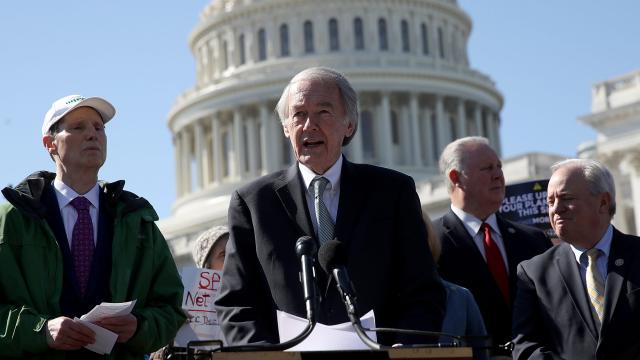Democratic lawmakers on Tuesday formally introduced legislation to save net neutrality from the corporate-greased mitts of the Federal Communication Commission. The measure is likely to fail to reverse the FCC’s bludgeoning of the open internet – but if so, it comes packed with a ticking time bomb for Republicans. At least, that’s the plan.
Led by Massachusetts Sen. Ed Markey, the resolution would reverse the Restoring Internet Freedom order through the Congressional Review Act, which allows Congress to overturn agency regulations. The FCC’s Republican majority passed its misleadingly named order in mid-December, overturning earlier FCC rules that prevented internet service providers from blocking or throttling online content or creating “fast lanes” for companies willing to pay more for better service for their users.
In the Senate, the resolution has 50 of the 51 votes needed to pass the chamber’s Republican majority, with all 49 members of the Democratic caucus (which includes two independents) and Maine Republican Sen. Susan Collins backing the measure. On the House side, however, the resolution still needs the support of more than 100 lawmakers to pass — and even then, it needs to get past President Donald Trump’s veto pen.
Speaking at a rally on Capitol Hill on Tuesday, Markey called the push to reverse the FCC’s order a “revolution” while lambasting the commission for favouring ISPs over internet users and entrepreneurs. “The internet is for everybody, not just for Verzion, Charter, AT&T, and Comcast,” Markey said, adding the crucial detail: “We need just one more vote.”
In the very likely chance the Democrats’ resolution fails, they plan to make it a “major issue” ahead of the 2018 midterm elections this fall, Senate Minority Chuck Schumer said at Tuesday’s rally. Markey put the wager in plain terms.
“When we take on the Senate floor, every one of my Republican colleagues will have to answer this question: Who’s side are you on?” Markey said. “Do you stand with hard-working families for whom the internet is essential, or do you stand with the big money, corporate interests, and their army of lobbyists?”
While Republicans generally oppose government regulation, net neutrality is unique in its bipartisan support, with both Republican and Democratic voters overwhelmingly in favour of strong rules enforcing net neutrality, according to a thorough study the University of Maryland released in early December. However, Republican lawmakers have largely stayed out of the fight, leaving blank spots in their voting records on net neutrality.
In addition to the Democrats’ plan, several internet rights groups, as well as at least 23 state attorneys general, have sued the FCC over passage of the Restoring Internet Freedom order, creating another avenue for possible repeal. The Internet Association, a lobbying group that counts Google, Facebook, Amazon, and dozens of other major tech firms as members, has also vowed to intervene in the lawsuit in support of net neutrality rules.
Internet rights groups are urging voters to contact their representatives in Congress today in an attempt to shore up as much support for the Democrats’ measure as possible before the big vote forces lawmakers to put their stance on net neutrality in the public record.
With the measure still unlikely to overturn the FCC’s order due to a Republican blockade, however, the challenge becomes getting the voters who care about net neutrality – or even understand why it matters – out to the polls this November.
